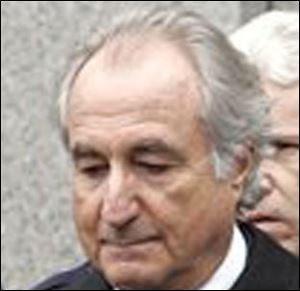
EDITORIAL
JPMorgan’s penalty
1/12/2014
Madoff
JPMorgan Chase will pay $2.6 billion to settle federal charges that the bank turned a blind eye to the Ponzi scheme run by Wall Street financier Bernard Madoff. The penalty, which includes $1.7 billion for the fraud’s victims, is welcome. But it’s hard to fathom why no one at the bank was indicted.
Madoff pleaded guilty in 2009 to defrauding 4,500 investors of an estimated $17.3 billion; he is serving a 150-year prison term. JPMorgan, his banker for 22 years, was suspicious of Madoff’s activities as early as 1998.
Even though federal law required the bank to notify federal authorities of its concerns, it did not. JPMorgan merely cleansed its portfolio of Madoff investments just before his indictment.
It’s good that JPMorgan is paying a stiff fine for its enabling role in Madoff’s fraud, and that most of the payout will go to his victims.
Yet the $2.6 billion penalty — along with the $13 billion settlement the bank reached with the government last November over dubious mortgage-bond practices — is less than the bank’s 2012 profit of $21.3 billion.
Under the deal with federal prosecutors in New York, no JPMorgan employees will face charges for the bank’s role in enabling Madoff’s fraud, even though some of the bank’s officers were suspicious of the operation. When a bank is involved in criminal activity, the principle should be: Banks don’t cheat people — bankers do.
To JPMorgan, a stiff fine but no prison time is an easy punishment to swallow — one that lets it off too easily for helping a scam artist defraud thousands of investors of billions of dollars.